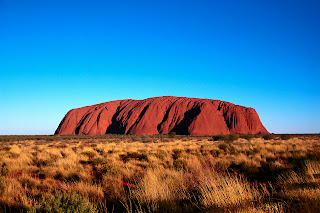
Uluru is a highly sacred place to the Aboriginal people. The features that are seen on the rock even have mythical stories that explain why they are there. It is obvious that this natural formation in central Australia has high importance to them.
 There are many positives and negatives to allowing people to walk on Uluru. Some of the negatives are that it is a safety hazard, 35 people have died while walking to the top. The environmental state of Uluru is slowly declining, and if Australians want to still have it in a few hundred years time they might need to slow this procedure down. Some positives are that it is also a massive commercial symbol, and makes money not only for the tourism industry but also retail.
There are many positives and negatives to allowing people to walk on Uluru. Some of the negatives are that it is a safety hazard, 35 people have died while walking to the top. The environmental state of Uluru is slowly declining, and if Australians want to still have it in a few hundred years time they might need to slow this procedure down. Some positives are that it is also a massive commercial symbol, and makes money not only for the tourism industry but also retail. 
Some tourists to Uluru have said:
"The sooner societal respect is shown to the world's most ancient living culture, the richer our society will be."
"All people should be able to experience it's beauty."
"If we weren't allowed to climb it, a major part of our tourism industry would be damaged."
"It is right for Aboriginals to want to protect it, because it is sacred to them."
"Tourists walking on it are slowly damaging it."
"People shouldn't litter or damage it but they should have the chance to walk up it."
"Uluru is sacred, just like a church."
I haven't personally been to Uluru, but I can understand it's importance to both the Australian tourism industry and the Indigenous people. I think tourists should be properly informed about it's sacredness and the risks before making the trek, and possibly stricter rules need to be put in place to ensure it's future. But I think people climbing Uluru shouldn't be ruled out completely, because I'm sure it would be a magical and truly great Australian experience and lifetime experience.


No comments:
Post a Comment